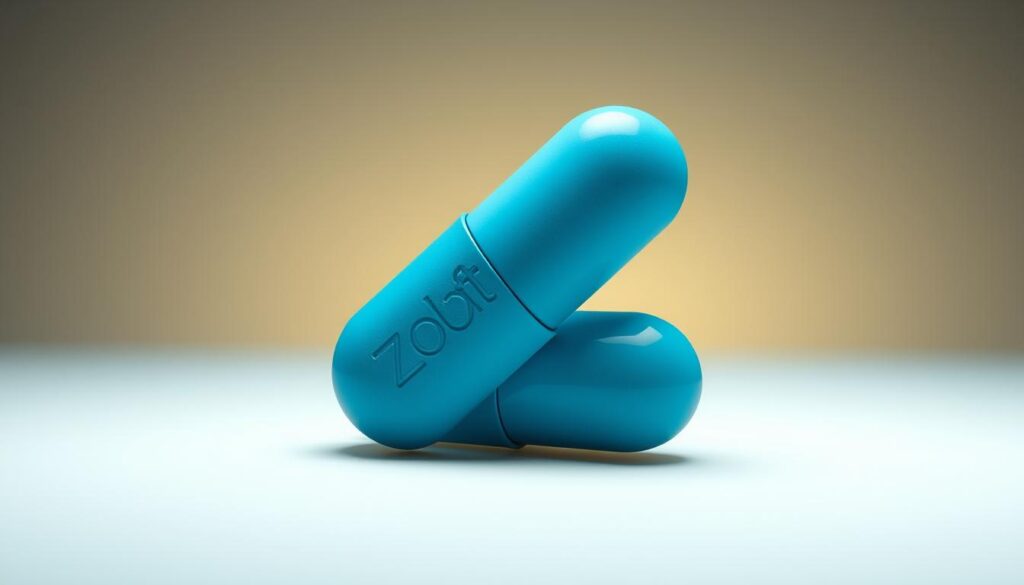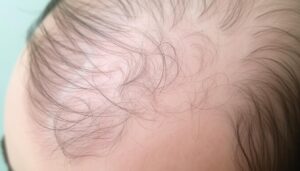If you’re taking Zoloft, also known as sertraline, you might wonder if it causes hair loss. This is a common worry for those using this drug for mental health. We’ll look into the link between Zoloft and hair loss. You’ll get the info you need to understand this side effect.

Key Takeaways
- Zoloft, or sertraline, is a widely-prescribed antidepressant medication that can potentially cause hair loss as a side effect.
- Factors such as dosage, duration of use, and individual variations can influence the likelihood and severity of Zoloft-related hair loss.
- Understanding the relationship between Zoloft and hair loss can empower you to make informed decisions about your treatment and maintain your overall well-being.
- Hair loss solution: Scalp Micropigmentation
Understanding Zoloft and Its Potential Side Effects
Zoloft, also known as sertraline, is a common antidepressant. It’s part of the SSRI class. It helps with depression, anxiety, and obsessive-compulsive disorder. But, it can cause side effects that patients should know about.
What is Zoloft?
Zoloft works by balancing serotonin in the brain. Serotonin is key for mood. It helps with depression, anxiety, and other mental health issues. You can take it as a tablet or liquid, once a day, with or without food.
Common Side Effects of Zoloft
Zoloft can cause different side effects. Some are more common than others. Here are a few:
- Nausea
- Diarrhea
- Insomnia
- Decreased sex drive
- Dry mouth
- Fatigue
- Dizziness
Not everyone will get these side effects. How bad they are can vary. If you have ongoing or worrying side effects, talk to your doctor.
Some people worry about Zoloft hair loss or sertraline hair loss. Research is still going on. But, some studies suggest a link between Zoloft and hair loss. The exact reason is still a mystery.
Does Zoloft Cause Hair Loss?
Many people wonder, can Zoloft cause hair loss? Zoloft, or sertraline, can cause hair loss, known as telogen effluvium. This is a temporary condition. It happens when certain medications, like Zoloft, affect the body’s hormonal balance.
The exact reason for Zoloft-induced hair loss is still a mystery. But, it’s thought to be linked to how the drug changes hormone levels in the body. This can make hair follicles go into a resting phase too early.
Not everyone on Zoloft will lose their hair. The chance of this side effect varies. Things like your body’s response, the dose, and how long you’ve been taking Zoloft can affect it. However, there is still a connection between sertraline and hair loss.
Recognizing Zoloft-Related Hair Loss
- Signs of Zoloft-related hair loss include more hair falling out, especially when brushing or washing. You might also notice your hair getting thinner on your scalp.
- These symptoms can start a few months after starting Zoloft or when you increase your dose.
Scalp Micropigmentation
Scalp micropigmentation (SMP) has emerged as a revolutionary solution for those experiencing hair loss, particularly individuals who may be dealing with the effects of certain medications. As people seek solutions for their hair loss, questions often arise regarding the potential side effects of popular antidepressants like Zoloft.
If you are wondering which antidepressants cause hair loss, know Zoloft is one of them. Understanding the connection between antidepressants and hair loss is crucial, as it can help individuals weigh their options when it comes to mental health and aesthetic concerns.
For those concerned about how to stop hair loss from Zoloft, scalp micropigmentation offers a non-invasive approach that can help restore confidence and provide the appearance of fuller hair. This cosmetic procedure involves tattooing tiny dots on the scalp to mimic the look of natural hair follicles.
Conclusion
Overall, there is a connection between Zoloft and hair loss. If you are going through this, consider scalp micropigmentation (SMP). As the conversation around mental health continues to evolve, approaches like scalp micropigmentation can play a vital role in supporting individuals on their journey.
Come to ScalpMasters, where we will help you every step of the way and answer any questions you have. If you are ready to start your SMP journey, contact us today to schedule a consultation.










